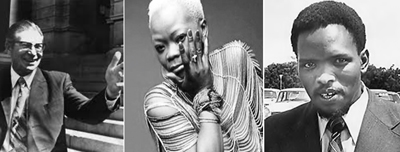Latest News Archive
Please select Category, Year, and then Month to display items
31 January 2024
|
Story EDZANI NEPHALELA
|
Photo ANJA AUCAMP
 Dr Martin Laubscher’s thesis, crowned with the Andrew Murray-Desmond Tutu Prize, is testament to the university’s unwavering commitment to scholarly excellence.
Dr Martin Laubscher’s thesis, crowned with the Andrew Murray-Desmond Tutu Prize, is testament to the university’s unwavering commitment to scholarly excellence.
In a historic triumph that reverberates over four decades since its inception, the UFS has clinched the coveted
Andrew Murray Prize – now renamed the Andrew Murray-Desmond Tutu Prize – for the first time. Standing shoulder to shoulder with institutions such as the University of Pretoria (UP) and Stellenbosch University (SU), this achievement marks a significant milestone in the UFS’ journey.
At the heart of this accomplishment lies the profound contribution of
Dr Martin Laubscher, distinguished Senior Lecturer specialising in Practical and Missional Theology in the
Faculty of Theology and Religion. Dr Laubscher’s dedication and scholarly prowess culminated in the groundbreaking work titled
Publieke teologie as profetiese teologie? (Public theology as prophetic theology), a revised edition of his doctoral thesis, which was originally crafted at Stellenbosch University in 2020, with a focus on the eminent Karl Barth.
Dr Laubscher received the Andrew Murray Prize for Theological Books in Afrikaans for his research and insightful analysis. The journey started when he realised, under the guidance of his study leader,
Prof Dion Forster, that his script had the potential to be published in Afrikaans. Sun Media’s interest in publishing this work in Afrikaans, led to it being the first-ever published thesis in Afrikaans. Dr Laubscher recalls, “I was grateful and excited about Sun Media’s interest. The book emerged within a year, and during a celebratory launch Prof Forster suggested I submit it for the Andrew Murray Prize.”
Earlier this year, Dr Laubscher was excited to learn that he was being shortlisted for the prestigious award. Reflecting on the significant moment, he shares, “The elation I felt upon receiving the news was unparalleled. I was not only celebrating a personal triumph, but also etching my name as the first laureate from our faculty to secure this prestigious accolade.”
Understanding the nature of prominence
2014-03-14
|
 |
What did Hendrik Verwoerd and Steve Biko have in common? Or perhaps Johannes Kerkorrel and Brenda Fassie?
“They all possessed a certain natural predisposition to prominence,” says Prof Paul Fouche, reseacher in psychobiography at the University of the Free State’s Department of Psychology.
Prof Fouche and a team of researchers from other South African universities released findings on psychobiographical studies done on personalities that played a great role in our history.
The studies show that notable historical figures were very often prolific readers with a passion for literature since childhood. Generally, they also had a great love for nature and a sense of the sacredness of it, as well as a love for the cosmos.
The study further reveals that many of them were forced to take up leadership roles in the family from a very young age and were driven to succeed in order to take care of their own.
In many of these cases, there was a strong partner who supported the leader while they went about the business of governing their world.
Psychobiography is the systematic and descriptively-rich case study of renowned, enigmatic or even contentious individuals in socio-historical contexts within a psychological frame of reference. Over the past decade, psychobiography has become an established research genre and a methodology used by various academics and scholars in the field of life history research.